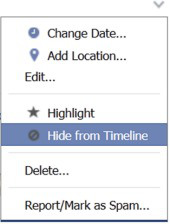Facebook and Twitter musings give employers a peek into our real selves, research finds
 A job interview is a difficult way to find out whether a job candidate will wind up doing a good job if he or she gets hired.
A job interview is a difficult way to find out whether a job candidate will wind up doing a good job if he or she gets hired.
So how can companies better gauge the future performance of their hires?
Don Moore, an associate professor at the Haas School of Business at the University of California, Berkeley, suggests that structured interviews that provide quantifiable ratings, coupled with intelligence tests, can help to reduce the need to rely on unreliable gut instincts.
Then again, employers can always simply check out job candidates’ social media postings.
New research from the Department of Psychology at North Carolina State University examined whether job applicants’ personality characteristics can in fact be inferred through the content of their social media postings.
The study wasn’t designed to find out what character traits are related to negative behaviors.
Rather, it analyzed which characteristics are related to leaving traces of negative behavior in a public, online, social space, where people are less likely to keep a lid on their behavior.
The research focused on two types of postings cited by hiring managers as sending up red flags about applicants: bad-mouthing of superiors and peers, and postings concerning alcohol and drug use.
The research focused on what’s known in the field of psychology as the Big Five personality variables: openness to experience, conscientiousness, extraversion, agreeableness, and emotional stability.
The object of the research was to come up with evidence that can be used by researchers, applied psychologists and, yes, employers who might turn to social-networking employment screening.
Study participants self-reported their social media content as it related to photos and text-based references to alcohol and drug use, as well as to criticisms of superiors and peers (bad-mouthing).

The results were unsurprising and supported researchers’ hypotheses that predicted that disagreeable or non-conscientious people would be more likely to bad-mouth their peers and employers.
What do these terms mean? In psychology, “agreeable” people are generally characterized as being courteous, flexible, trusting, good-natured, cooperative, forgiving, soft-hearted, and tolerant.
Such people, the theory goes, are unlikely to be critical, cynical, or to hold disparaging viewpoints that prompt bad-mouthing.
“Conscientious” is defined in terms including careful, thorough, responsible, organized, systematic, deliberate, hardworking, self-disciplined, and persevering.
Such people would be expected to heed warnings about using social media inappropriately or in unprofessional ways, and prior research has shown that conscientious people tend to take a more guarded approach to Facebook postings than to flaunt their wild partying lives.
Extraverted people, meanwhile – those who tend to be sociable, gregarious, assertive, talkative, and active – were more likely to post about alcohol and drug use.
The research serves as a good reminder about how employers are diligently harvesting the fruits of our online behaviors to better assess whether they want to hire us or run screaming in the other direction.
We post plenty of online material to send them running, that’s for sure.
As I reported in September, 57% of college students think their Facebook postings are fine.
Too bad that 69% of recruiters report finding candidates whom they wouldn’t let step through the door, thanks to social media evidence of drinking, drugs, bad-mouthing previous employers, lying on their resumes or a host of other sins.
Keeping posts private is one way to avoid handing employers a reason to fire you or potential employers a reason to avoid hiring you in the first place.
That, actually, is tip number one on Sophos’s 5 tips to keep your Facebook account safer.
Then too, tip number one on Sophos’s follow-up list of even more Facebook tips is to stop search engines from indexing your profile.
 Keeping things tucked down on Facebook and other social media spaces is a baseline way to attempt to maintain your privacy, but keep in mind that privacy isn’t legally guaranteed in all countries or in all US states.
Keeping things tucked down on Facebook and other social media spaces is a baseline way to attempt to maintain your privacy, but keep in mind that privacy isn’t legally guaranteed in all countries or in all US states.
Employers haven’t shied away from demanding that potential employees hand over their Facebook user name and password if they want to get a job.
Spied-on employees, understandably, don’t like the notion much, with 91% of Naked Security readers saying it should be illegal to ask for such data.
In the US, some state legislatures have moved to protect employees’ privacy.
From the site of the National Conference of State Legislatures, here’s a summary of current state legislation on laws regarding employer demands for social media passwords.
As of 12 September 2013, legislation preventing employers from requesting passwords to personal internet accounts to get or keep a job had been introduced or was pending in at least 36 states. Ten states – Arkansas, Colorado, Illinois, Nevada, New Jersey, New Mexico, Oregon, Utah, Vermont and Washington – had enacted legislation as of that date.
If you’d like to stay on top of who’s getting into trouble on Facebook and other security matters, think of plugging into Naked Security’s Facebook page.
Image of drunk guy courtesy of Shutterstock.
Article source: http://feedproxy.google.com/~r/nakedsecurity/~3/XhHCkH8GG3c/